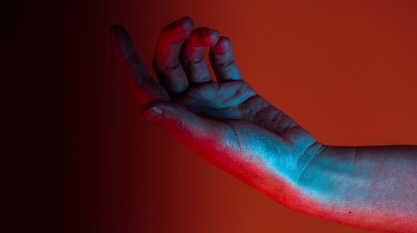 Neuroscience & Mind
Neuroscience & Mind
Dr. Egnor on Free Will and the “Alien Hand”


In organizations of any size, you need to coordinate efforts between co-workers to make sure of not giving the impression, to the outside world, that “the left hand doesn’t know what the right hand is doing.” Of course it’s all too easy for busy colleagues not to know what their fellows are doing, and the results can be awkward. (This never happens at Discovery Institute, of course.)
In the context of organizational dynamics, the saying about left hand and right hand is just a metaphor. In neuroscience, remarkably, it can be the literal truth.
“Alien Hand Syndrome”
At the Bradley Center’s Mind Matters, neuroscientist Michael Egnor has an absolutely fascinating essay on “alien hand syndrome,” where patients complain that one hand undoes actions performed almost simultaneously by the other. For example, one hand buttons your shirt while the other hand closely follows it and unbuttons the buttons.
A reader posed the question to Dr. Egnor whether this disproves the unity and freedom of the will. It appears that the patient wills two things simultaneously: getting dressed and getting undressed. Egnor replies, to summarize, that the actions with their split purposes are really functions of the appetite (a material phenomenon of the brain) not the will (an immaterial phenomenon not located in the brain).
Egnor:
No, alien hand syndrome doesn’t mean that free will is not real. In fact, it clarifies exactly what free will is and what it isn’t. We have, broadly speaking, two kinds of volition. In common with animals, we have appetite. Appetite is volition that arises from material processes in the brain. Appetite may or may not be entirely conscious, but it entails motor acts and perceptions linked to specifics of the environment — a keyboard, a button, a bowl of food, or a sexually attractive person. We, along with non-human animals, experience powerful appetites arising from brain processes (neurochemicals, action potentials, and the like) all of the time. In fact, appetite is the only type of volition that non-human animals experience.
But human beings have another kind of volition as well. We have will, which, unlike appetite, does not arise from brain processes. Will follows from intellect, which is the human ability to think abstractly, without linking the thought to particular objects. I may desire an extra slice of cake (appetite), but I think about how bad that would be for my nutritional health (intellect) and decide, based on my abstract concern for my health, to forgo the cake (will). My will can override my appetites.
Because will follows on intellect, which is an immaterial power of abstract thought, will is free, in the sense that it is not determined by physical processes such as brain chemicals.
The denial of the mind, an immaterial power, is one of the dogmas of scientific materialism, as Stephen Meyer and Eric Metaxas discuss in the Socrates in the City conversation I recommended here a few days ago. Read the rest of Professor Egnor’s essay at Mind Matters.
Photo credit: ian dooley via Unsplash.
